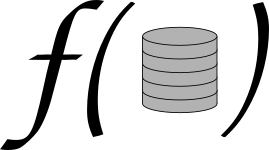Climate change discussion at EDBT/ICDT 2021
The 2021 edition of EDBT/ICDT took place online, and featured a session on climate change, the second one taking place at that conference. I chaired this session, and we had the pleasure of having Benjamin Pierce (University of Pennsylvania and Clowdr CIC) as an outside guest.
The session gathered up to 40 participants. It featured a presentation that summarized the issue of climate change and the previous climate change session, as well as the report written as a conclusion of that session. Then, we had a discussion featuring members of the community and Benjamin Pierce. Several topics came up during the discussion:
- The TCS4F manifesto, and whether EDBT/ICDT ought to sign it.
- Whether to require authors to travel to future conference editions, or make video presentation a guaranteed option. This relates to Vardi’s column in 2020 (and its followup), and the two-year experiment by TCRTS on making all conferences hybrid for two years, allowing remote attendance by paper authors.
- The impact on climate change that our community can have, in addition to flying less (when it becomes possible again). About this, Benjamin Pierce pointed out the paper outlining how machine learning research can help address climate change issues.
- The impact of online conferences on networking for early-career researchers. There are no easy answers here, but online conferences also make it possible for more people to attend, including people that would not have otherwise had the funding or the opportunity to travel. There is a post on the SIGPLAN blog about the specific topic of early-career researchers.
- The right format to adopt for conferences in the future, including the options of merging conferences, splitting them up geographically, thematically, etc. About this, there is again a relevant post on the SIGPLAN blog.
- The need for statistics to understand how people engage with online conferences, including how many participants actually attended sessions etc.
- (In follow-up discussion:) the question of estimating the carbon footprint of trips avoided thanks to online conference editions.
- The challenges in giving a social aspect to online conferences, which are the topic of ongoing research, and are being addressed by Benjamin Pierce’s Clowdr platform.
- The format of hybrid conferences, and the fact (pointed out by Benjamin Pierce) that once conferences stop being fully online by necessity then they will have to be hybrid by necessity, for several months if not years.
- The question of timezones when organizing online conferences. There are no straightforward solutions to this problem, but the switch to online conferences has encouraged experimentation with the format, e.g., having very short days or even a weekly meeting instead of contiguous full days.
- The switch at SIGPLAN to the PACM series for proceedings, to make conference publications more similar to journal publications, and decouple them somewhat from the physical conference. PACM is used by almost all SIGPLAN conferences.
The session concluded with a poll to gauge the opinion of the audience. At that stage of the session, there were only 16-21 people voting, so this is only informative. We asked:
- Do you agree that EDBT/ICDT should adapt its practices (post-COVID) to mitigate climate change?
- 15 answered yes, 4 were unsure, no one answered no
- Do you believe that EDBT/ICDT should commit to the IPCC goals of reducing our emissions by at least 50% before 2030 (relative to pre-2020 levels)?
- 10 answered yes, 6 were unsure, 1 answered no
- Should EDBT/ICDT authors be guaranteed that they do not have to physically travel to the conference (if they cannot or do not want to)?
- 11 answered yes, 3 were unsure, 2 answered no
- Would you personally be ready, in future years, to only physically travel to EDBT/ICDT every other year (and reduce your emissions by 50%)?
- 12 answered yes, 7 were unsure, 2 answered no
- What is your preferred model for EDBT/ICDT in the (post-COVID) future?
- 15 preferred an on-site conference every year but with high-quality remote participation
- 3 preferred an online conference every year, but with one or many attractive “hubs”
- 2 preferred to alternate between on-site and online
- no one wanted to return to business as usual, or to move to “something else”
I hope that we can continue this discussion about the future of the conference model, so that we can transition to a sustainable model that serves the goals of our community. To discuss the issue of climate change specifically, you can use the acm-climate mailing-list, and you can also follow to the TCS4F blog.
- Read more about Climate change discussion at EDBT/ICDT 2021
- Log in or register to post comments
